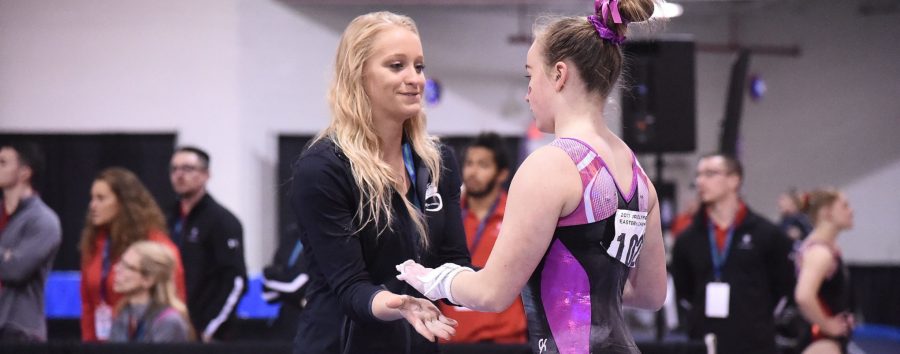“Knowing that I have supportive coaches makes the overall environment at meets and practice feel very comforting which helps me relax and perform to my full potential,” Frosh. Sarah Moraw said. Moraw is in her tenth year of gymnastics and is going into her third season as a level ten. She has spent her entire career training at Champion Gymnastics USA of Holland under various coaches. Moraw appreciates that she has coaches that always want the best for her and make her “feel more confident” in herself. Unfortunately, not all gymnasts have had the same healthy coaching environment that is found at Champion.
An older Champion USA level ten gymnast remembers injuring her foot on a bar dismount at her former gymnastics club. She sat on the mat, disappointed that she had injured herself once again. Her coach was furious. “I got screamed at for sitting,” she said. “My coach said ‘If it’s that bad, go get your own ice.’” She limped from the bars in the back of the gym all the way to the freezer in the front of the building, all while trying to not injure herself further. She found out a few days later that she had, in fact, fractured her growth plate.
A similar situation occurred at Champion Gymnastics recently. A gymnast had a scary fall on a bars skill, slamming her feet on the bar and her face on the mat. Her coach immediately headed over and asked her if she was okay and if she needed any ice. Luckily, the gymnast did not seriously injure herself, but the coach still showed kindness and concern.
Athletes at Champion have a trustful relationship with their coaches. They know that none of the gymnasts would lie to them about serious injuries. There has never been a time in those walls that an athlete has been yelled at that they are faking, lying, or “acting like a baby.”
Injuries are taken very seriously at Champion, with an emphasis taken on coming back the right way so that injuries are not prolonged. Coaches never sacrifice their athletes health at a competition or at practice.
Every athlete has to deal with bad days, but there are definitely different ways coaches can react to an athlete who is struggling. One current level ten recalls a day when she was 11 years old. She could not make a skill in her bar routine despite putting in full effort. Her coach continued to yell at her for falling, not even giving her corrections on what to fix. “He would push me off the bar and into the foam pit every time I wouldn’t do it right and yell at me,” she said. She was visibly upset and started to cry out of both frustration that she was not making the skill and sadness that her coach was angry at her. When her coach saw her crying, he told her “if you’re going to act like a dog that’s been kicked you’re going to be treated like one.” She was then ordered by this coach to stand with her nose against the wall for an hour.
The difference in Champion coaches is that they treat their gymnasts like they are human. They know that everyone has bad days. They do not punish for these bad days. Instead, they are understanding and have a calm conversation with the struggling individual about how she is feeling. When an athlete is crying, every coach in the gym will tell her to take a deep breath and get a drink to calm down. Again putting safety first, coaches will emphasize that it is important to calm down before attempting a skill again because they do not want anyone to hurt themselves when they are not focused. All coaches assure the struggling gymnast that “everyone has those days” and that the next will be better.
The reality of coaching any young kids in sports is that there are going to be times when the athletes are unfocused or not listening as they should be. There are, of course, many ways to handle this situation, but some ways are too aggressive or harsh for any kids.
Another Champion gymnast who is currently training level ten recalls being at a camp in central Michigan with a different coach when she was younger. Her friend was talking and not paying attention to instructions. The coach at the camp turned and faced the gymnast and told her to “slap her.” It seems like this would be a joke, but the coach assured she was not kidding. The gymnast was in shock that a coach, whom she barely even knew, just told her to slap her friend for not listening. The gymnast stood strong and did not slap her friend, but she was still terrified of this coach. “I was eight years old at the time. I was so scared of her that I pretended to be sick the last day of camp so I did not have to go with her.”
It can be hard, especially for the younger gymnasts to pay attention all the time, but there are certainly better ways to deal with it than using physical actions or pitting teammates against each other. When gymnasts are not listening at Champion, the coach will be stern and tell her that she should be listening, but they will never raise their voice. When coaches start yelling, it makes both sides upset and the situation escalates to a point that is unnecessary.
The sport of gymnastics takes up more time than most. Those at the highest levels practice anywhere from 20 to 30 hours in one week while still attending school and social events. With that much practice, missing one is typically not punishable. Unfortunately, this is not the case at some gymnastics clubs.
At one particular club closer to the East side of Michigan, gymnasts were punished for missing practice by having to sit out at the next practice. One gymnast told of a specific instance when she was given this punishment. She informed her coaches ahead of time that she was going to miss practice because she was getting an x-ray for her broken foot. She showed up to the next practice and was not even let into the gym. “I had to sit in the lobby for the whole practice [5 hours] and nobody was allowed to talk to me.”
Sitting for hours, watching teammates work hard, hearing parents ask why a member of the team is not participating fosters an unwarranted feeling of worthlessness.
The coaches at Champion are always understanding that gymnastics takes up a lot of our time and that there will be days that athletes do not make it to practice. There are times when the coaches even encourage missing practice for a day for family and school events. Especially when talking to high school gymnasts, the coaches will always say school comes first. Just the other day, a gymnast was very stressed out about all of the schoolwork she had to get done. When the coach heard about this and saw that she was struggling and worried, she suggested that the gymnast leave early to get some extra study time.
That is something that every gymnast at Champion is thankful to have: a coach that understands that missing one practice will not ruin the entirety of the season, which seems to be the mentality that other coaches might have.
Stories of physical harm have always circulated the gymnastics community, but it is easy to assume all of the stories were from long ago. Sadly, current gymnasts still have experiences when their coach has pushed too hard.
One freshman gymnast had an experience of her own when she was only seven years old at another gymnastics center less than an hour away. She was stretching with her teammates at the end of practice when her coach came up to her and began to stretch her. “I was fine until he started going farther,” she said, “ He knew that it was hurting me and he knew that I was resisting. I could feel my muscles getting stretched farther and farther. And I couldn’t help but start to cry.” She tried to tell him to stop, but he just kept pushing. When he finally let go, “he gave me a disappointing look and yelled next!” like it was no big deal that he had just pushed a little girl to tears of pain.
It is always hard to define the line between pushing an athlete and going too far. In this case, the line is a mile away. It seems impossible that any coach would think it is all right to push a gymnast to a point of extreme pain, especially a gymnast who is so young. There is, of course, a need to push athletes for them to get better, but there is a balance.
Coaches at Champion frequently will stretch gymnasts, but never even close to the point of tears. It is always lighthearted and no one is singled out. It is simply not necessary, and the coaches know that.
Everyone who goes to Champion knows that the coaches are the top of the line. They produce great athletes and great people without using abusive and mean strategies. Moraw said that “ultimately, [having supportive coaches] allows me to have more fun when practicing and competing.”
There are still gymnastics coaches that yell and scream, but luckily this is not the reality everywhere.







